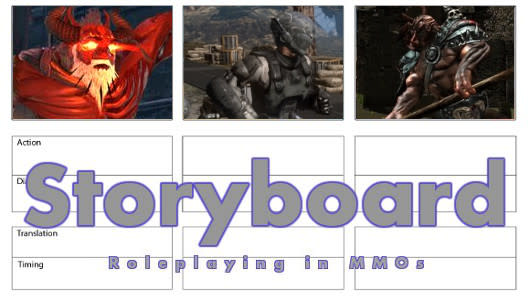Storyboard: Secrets that aren't helping
Roleplaying characters are often secretive sorts. This is understandable; a lot of people are secretive sorts. Sure, you're not deceptive, but you harbor a secret affection for Lady Gaga that you don't want to tell anyone about, or you secretly did forget to feed the cat that one time she broke into the cupboard and ate an entire bag of cat food, or you're secretly cheating on your girlfriend (but it's fine because she's cheating on you, you think).
The problem is that in roleplaying, some secrets are just plain better than others.
Keep in mind that I'm talking about specific secrets here, not just things that people might not know yet. There are certain secrets that are just plain counterproductive, and it's better to have these things stated outright rather than held in reserve for the future. Even if it's supposed to be a secret, some secrets are better revealed than kept because keeping 'em isn't doing you any favors.

The secret past
I've mentioned before that one of my favorite characters in television, period, is Elim Garak from Deep Space Nine. I liked him so much that I even based a character on him. The idea that this outwardly polite, genial, humble tailor was once a spy resonated quite powerfully, and I looked forward to every episode that shed more light on his secret past.
So when did we find out this was his secret past? The first episode of the series.
No, we didn't learn all of the details. But the interval between being told that he was just a tailor and being told that he was most certainly not just a tailor was pretty short. And it's not just Elim; most of the characters with secret pasts in Lost, for another TV example, had those pasts discussed within a few episodes of introduction. We find out Locke's big mystery in the third episode, even though the rest of the characters don't find it out until much later, if ever.
That's not to say there were no secrets; just that the central question was raised right away. These secrets came into play very early. It's enough to know that the secret exists. Having a secret past is much more interesting when everyone knows there is a secret, even if the details aren't clear.
Holding on to a wholly secret past only works if the other characters around you can do legitimate research into your personal history. Sometimes this can work; setting up an elaborate AR game for your fellow roleplayers in The Secret World would certainly be fitting with that theme (and indeed, the roleplaying cabal I joined used something similar as an initiation). But you generally want to make a point of letting people know that your secret past exists rather than just hinting at it. Hint at details, not the existence, or you're missing out.

The secret you don't know
This one is purely on the shoulders of the player, not the character. If your character has a secret, you should know exactly what the truth is. From the first time it comes up. Maybe there are a few details here and there to be filled in, but you know that your Klingon general in Star Trek Online is secretly the father of a Starfleet officer and refuses to fire on a Federation ship for fear of coming to blows against his estranged daughter.
Why? Because when people finally learn the secret, it's important that everything seems consistent. All the hints should add up. You don't want people pointing out that your general was all "let's destroy the Federation!" for months while still doing something shifty in the background.
I could hold up comic books here because honestly, Marvel and DC are some of the worst offenders of all time in this category, but instead, I'm going way back. I'm going to mention the X-Files. If you weren't watching it back in the '90s, you might not understand how popular and ubiquitous it really was. And throughout its early run, hints were dropped, portents were revealed, and fans tried to piece together how the conspiracy would fit together, how all of the plot threads would resolve.
Except they didn't. Any of them. It turned out that most of the supposed conspiracy was just random stuff, it never linked up in any meaningful way, and the show wound up wheezing to a stop in 2002 when it had long since ceased to look as if it was still building toward anything. It wasn't that the big secrets were unsatisfying; it was that they largely didn't exist. It was just random crap.
Your characters might not make their secrets public knowledge, but you should know what they're dealing with behind the scenes. If you're going to establish a secret, make sure you know what it is and write it down for yourself so you won't forget.
The secret lover
On one level, this is actually a very useful secret. I've had characters with secret relationships every so often -- sometimes because the relationship is an affair, sometimes because the character in question shouldn't be in a relationship with anyone, and in one case because the relationship was decidedly one-sided. (All right, it was more of a secret infatuation than anything.) So what's the problem here?
Simple. It's only worth keeping as a secret if there are some actual consequences. I've seen a lot of secret relationships kept secret for what appears to be no reason whatsoever, just because ooh secret lovers so mysterious and then you roll credits.
No. That isn't working. That's not good. If you're going to the trouble of keeping a relationship secret, you need something at stake. If there's no incentive to keep it secret, who in the world would opt for skulking about surreptitiously instead of openly declaring that you're dating someone? This isn't just a cast of not advertising; this is a case of outright hiding a relationship that does not matter if anyone finds out.
That's just plain silly.
Feedback, as always, is welcome in the comments below or via mail to eliot@massively.com. Next week, I'm going to talk about taking dead characters and bringing them back. The week after that, let's talk about filling in the blanks of roleplaying that you never did.

Every Friday, Eliot Lefebvre fills a column up with excellent advice on investing money, writing award-winning novels, and being elected to public office. Then he removes all of that, and you're left with Storyboard, which focuses on roleplaying in MMOs. It won't help you get elected, but it will help you pretend you did. If you need a refresher, check out the Storyboard Library.


